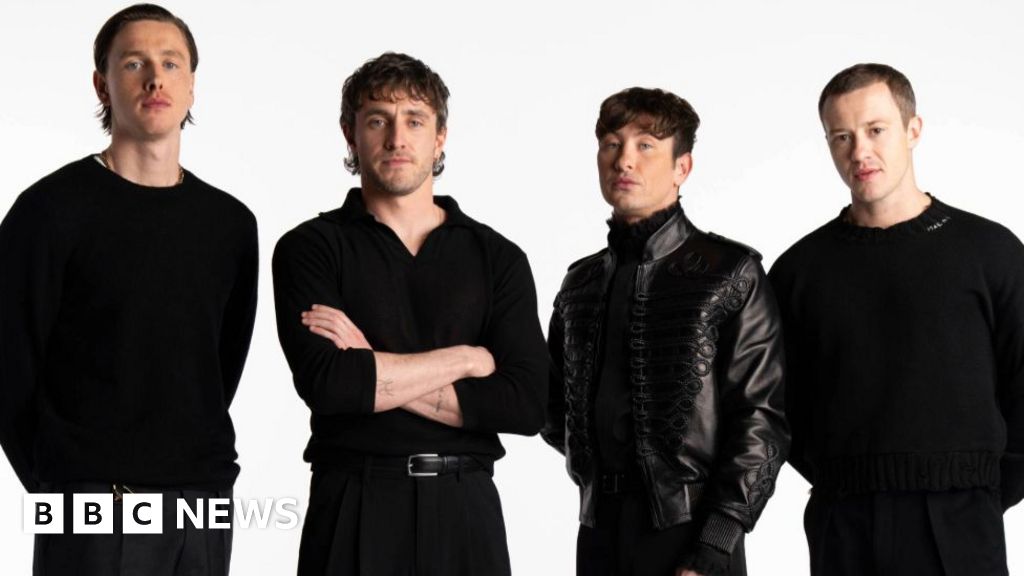The Beatles are set to be portrayed by Harris Dickinson, Paul Mescal, Barry Keoghan, and Joseph Quinn in a four-part film series directed by Sam Mendes, scheduled for release in 2028. This casting aims to attract a Gen Z audience, with each actor representing modern-day heartthrobs. The biopics reflect the band’s enduring legacy and seek to engage younger fans amidst a shifting cinema landscape post-COVID. However, concerns arise about the lack of local talent from Liverpool and the risks of relying on a multi-film strategy, given the challenges in the current box office environment. The project aims to revitalize Beatles mania.
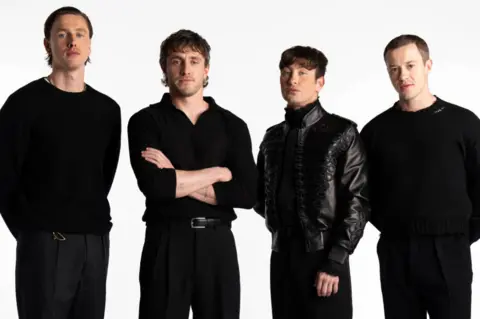
Sony
This week, the Fab Four gathered on stage for a star-studded announcement that left many on social media captivated.
No, Paul McCartney, John Lennon, George Harrison, and Ringo Starr aren’t reuniting via AI for a collaboration with Taylor Swift.
Instead, the legendary rock icons will be depicted by four of today’s hottest actors: Paul Mescal (McCartney), Harris Dickinson (Lennon), Joseph Quinn (Harrison), and Barry Keoghan (Starr) in a cinematic series directed by Sir Sam Mendes, slated for release in 2028.
These actors are quintessentially what one might call “the internet’s boyfriends,” a term defined by Glamour magazine as “a well-known or somewhat-known male figure whom everyone on your Twitter feed is enamored with all at once.”
When Sir Sam made his entrance along with his “band” at CinemaCon in Las Vegas on Tuesday, the intent was unmistakable.
If the Beatlemania of the 1960s was characterized by throngs of teen girls fainting and clamoring, the strategy now seems aimed at inciting Gen Z—who express excitement online by “screaming, crying, throwing up” from their screens.
“Each star brings their unique brand of modern hysteria,” noted Lisa McLoughlin, a celebrity journalist for the Evening Standard, “the type driven by social media trends and fan video edits.”
This particularly resonates with Mescal, as his rise to fame somewhat parallels the frenzy the Beatles once ignited.
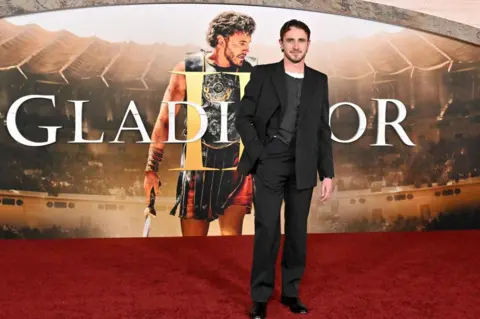
Getty Images
Rising to prominence from his role in the BBC’s adaptation of Normal People in 2020, the Irish star earned an Oscar nomination for his poignant performance as a troubled father in Aftersun, and subsequently achieved blockbuster fame in Gladiator II, transitioning from indie darling to Hollywood sensation.
Barry Keoghan, another Irish talent, mirrors this ascent. Also an Oscar nominee for Banshees of Inisherin, he embraced his rugged heartthrob image in last year’s cult favorite Saltburn.
Both Dickinson and Quinn are still early in their careers but are already making a significant impact—Dickinson recently starred alongside Nicole Kidman in the erotic thriller Babygirl, while Quinn garnered attention in Netflix’s Stranger Things.
McLoughlin describes the casting as “logical and predictable”—a strategic initiative as the band aims to solidify their legacy with a new generation, while studios endeavor to entice post-Covid streaming audiences back to theaters multiple times in relatively close succession.
A day in the life?
The timing and depth of this project encapsulate the Beatles’ extraordinary legacy as the best-selling band of all time, having revolutionized youth culture and reshaped the music scene.
It has been 56 years since all four members last recorded together. Lennon was tragically murdered just over a decade later at the age of 40, while Harrison succumbed to cancer in 2001 at 58. The two surviving members, Sir Paul and Sir Ringo, are now both in their 80s.
Nevertheless, Hunter Davies, the band’s only official biographer, shared on Radio 4’s Today program, “Strangely, the further we get from the Beatles, the more prominent they seem to become.”
In recent years, Sir Paul has focused on encapsulating the Beatles’ discography—he became the oldest headliner at Glastonbury at 80, while also promoting the 2023 release of Now and Then, a “final” Beatles single reconstructed from Lennon’s demo vocals. This marked the band’s 18th UK number one single, achieved more than fifty years after their last, and it won a Grammy.
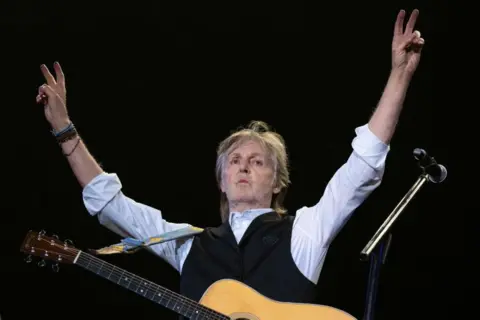
Getty Images
The upcoming films look to extend this legacy onto the big screen.
Four years after Peter Jackson’s extensive Get Back documentary, this marks the first occasion all four band members and their estates have permitted full life story and musical rights for a scripted feature.
The casting embodies the unique personalities and backgrounds of the group members, each resonating differently with fans entranced by Beatlemania.
McLoughlin believes the selections “make commercial sense”, effectively targeting an audience now separated by two generations from the original Beatlemania.
“They all have a dedicated younger following (many of whom might not frequently visit theaters or have a deep connection to the Beatles), along with the credibility and experience to lead or co-star in major productions.”
Each installment of the film series will highlight a specific member of the band. “Their stories intertwine in various ways—sometimes overlapping, sometimes not,” Sir Sam explained.
“They are four distinct individuals, and this could be an opportunity to explore their complexities more deeply.”
‘Binge cinema’
The Barbenheimer phenomenon from summer 2023 underscored the growing impact of online audience reactions on cultural significance.
It also accelerated Hollywood’s embrace of “event cinema” to attract younger viewers—a demographic that Warner Bros Discovery’s executive director Vera Chien pointed out already regards the relationship between streaming and social media as the standard.
Sir Sam’s slate of four films is designed to offer what Sony executive Tom Rothman characterized as “the first bingeable theatrical experience.”
“Honestly, we need significant cinematic events to persuade audiences to step out of their homes,” Sir Sam remarked.
Movies can develop unique digital identities through audience engagement, akin to the viral success of Saltburn.
The creators of the Beatles biopics are wagering that their cast of “internet boyfriends” will attract a younger demographic—one that’s less nostalgic about the Beatles but is active on social media, with the hope that they will be encouraged to transition from scrolling on their devices to enjoying the films on the big screen.
It remains unclear how much musical content will feature in these films.
However, the Beatles biopics could thrive in the profitable genre that has experienced awards acclaim over the last decade.
This area has also generated substantial heartthrob moments, with the Beatles’ cast joining the ranks of Jacob Elordi and Austin Butler’s portrayals of Elvis, in addition to Timothée Chalamet’s Oscar-nominated performance as Bob Dylan in A Complete Unknown.
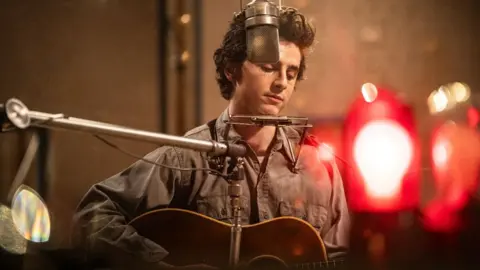
Searchlight
However, there are inherent risks, warns Dade Hayes, a business reporter for Deadline and co-author of Binge Times.
He notes that while he respects Rothman’s “clever approach” and appreciates the biopics’ “bold message regarding the significance of cinemas and communal viewing,” current market conditions suggest caution.
Firstly, the UK box office has yet to fully recover from the pandemic, while US ticket sales remain over 20% lower than pre-Covid levels. “If audiences aren’t eager to frequent cinemas regularly,” Hayes indicates, “you risk maintaining an expensive lot of assets that are challenging to monetize.”
Additionally, a strategy involving multiple releases hinges on the first installment being a success,” Hayes cautions.
He points to Kevin Costner’s Horizon films, which were initially planned as a multi-part theatrical series but fell apart when the first film underperformed as a cautionary example.
For McLoughlin, the three-year gap between the casting announcement and the 2028 release date poses additional risks, especially in a rapidly evolving online environment where fan communities can change swiftly.
Liverpool walking alone
Beyond the dynamics within the industry, there’s a significant point of discussion closer to home.
The Beatles biopics, which celebrate the journey of four Liverpudlian lads who took the world by storm, will not include any local actors in leading roles.
As one Liverpudlian remarked in a TikTok video that amassed over 200,000 likes: “I adore Mescal as much as anyone, but [the absence of local representation] is truly disheartening.”
McLoughlin concurs, highlighting that James Corden recently called on the television industry to be “bolder” and support ideas that might be somewhat daunting. She believes film studios should adopt a similar approach.
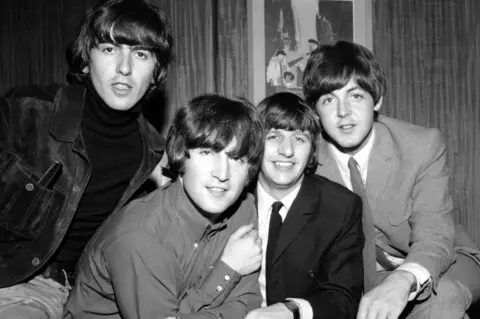
“The Beatles themselves were virtually unknown until they exploded onto the scene,” she observes. “This could have been a unique opportunity for a newcomer to experience their own iconic rise—emerging from obscurity in real time.”
As McLoughlin emphasizes, the deeper issue is the absence of local Liverpool actors in a Beatles biopic. “The band represents Liverpool’s greatest cultural export, yet the city’s rich talent pool has been entirely overlooked,” she laments.
Social media is already rife with skepticism regarding Keoghan’s ability to deliver a consistent Scouse accent, particularly given critiques of his vocal performance in Saltburn.
Still, as Hunter Davies remarked, the Beatles have always transcended local boundaries.
Back in 1966, Lennon classically declared them “bigger than Jesus.” More than five decades later, the studio producing the four films—and potentially the film industry as a whole—undoubtedly hopes for a resurgence of Beatlemania.
